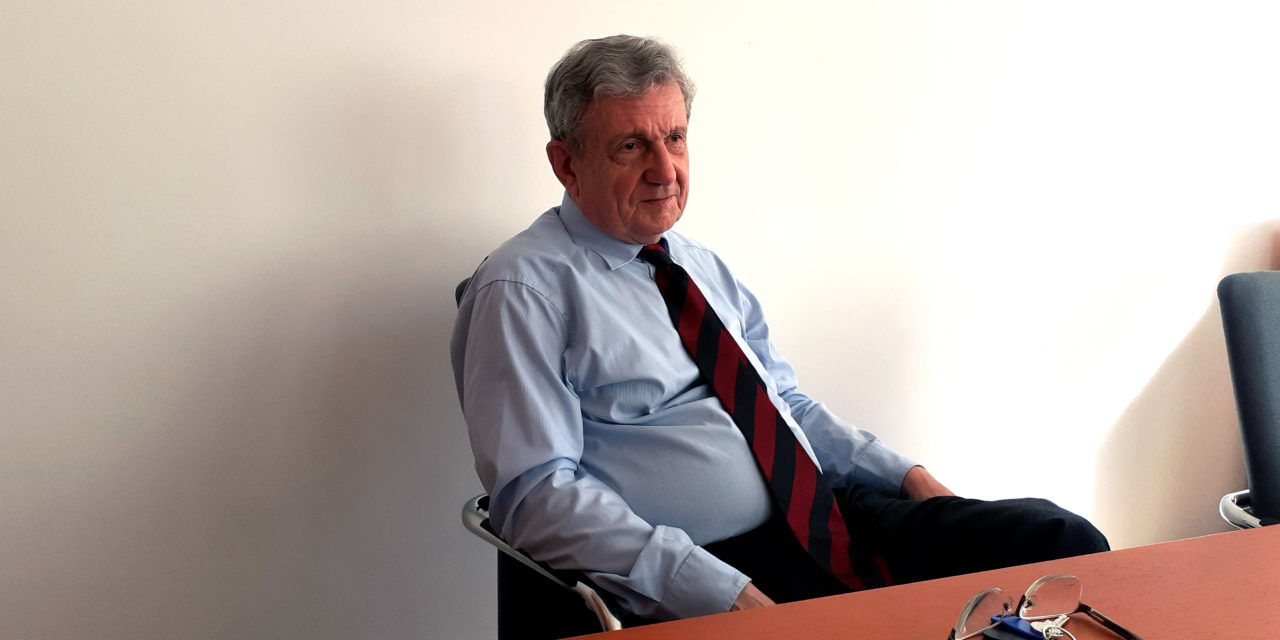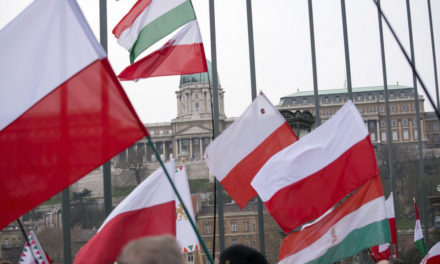What does divination have to do with gender, why is it unlucky to shout from the sidelines, and do more young people leave the scientific field than before? We talked with Miklós Maróth, president of the Eötvös Lóránd Research Network, about the past, present and future of Hungarian - and a little bit of international - science.
Professor, can Hungarian science be divided into eras without politics?
The first educational reform was a product of the Bach era, until then Hungary had an education system that could be called medieval, namely within the framework of Aristotelian philosophy; those who studied science learned almost everything, so this period can even be called the age of the last polymaths. In the framework of the 1855 reform, the six-class gymnasium was expanded to eight, and vocational education was created in the faculties of humanities and natural sciences, with German professors, on the German model. Then, towards the end of the century, came the passionate Hungarian professors who had a fantastic understanding of everything, charmed the audience - especially the female part of it - but they were not taken seriously internationally.
This type has also been processed in the literature.
Yes, there is such a professor in László Németh's drama Monster But this was changed by Kunó Klebelsberg, who sent Hungarian teacher candidates to doctoral courses abroad, so that they already represented the Western standard, affecting several generations of teachers. When I was a university student, I was also taught by them, but by that time, the new socialist docent class also appeared alongside them; the main problem of the latter is "to enter or not to enter?" had a dilemma. So these are the major eras until the regime change. Klebelsberg should be singled out because he did the most to raise Hungarian science to an international level, but unfortunately his plans were scrapped after the war.
Then came socialism.
At that time, the peace camp closed in on itself, where the political position, i.e. the Marxist treatment of scientific topics, became a criterion for the title of candidate.
Has there been a serious deterioration in quality?
Either deterioration or cynicism. If a work was rejected as lacking Marxism, it happened that the author randomly inserted a dedicated paragraph at the beginning and end of the dissertation and it was already on the rails.
Did we inherit all this?
More or less, we have been carrying the burdens of this age with us ever since. In the selection of academics, Marxist beliefs were important, the party directly supervised the selection processes of humanities departments, and this often did not work in favor of science.
How do Hungarian scientific fields stand in international terms?
I quote my physicist colleague Norbert Kroó, who said that the Rhine line is the top in Europe in terms of patents and publications. The best universities are located on both sides of the river, and from here the course slopes evenly both east and west. There are exceptional points on this slope, such as the University of Vienna, or Cambridge and Oxford; according to this comparison, French universities are generally better than English ones. If we measure the results with EU tenders, Hungary is the most successful in our region, if we measure quantitatively, then the Czechs are better.
Does the definition that science is a systematic system of human knowledge based on proven knowledge still hold its place today?
Even the Stoics said that systematized knowledge is called science, and since Aristotle we know exactly what this means: he set up the model – stipulations, axioms and laws of derivation – that we have accepted. And that hasn't changed. Of course, what falls within the scope of science is a different question, which varies from historical period to historical period; in antiquity, for example, even Cicero argued for the scientific nature of divination. So it was not clear where the border was even then, just as it is not clear today. gender studies was also admitted to Harvard , simply because there was funding for it. And money has no smell. By the way, it all started with the 18th century German school of history, they said that there is no truth in an absolute sense, just like goodness and virtue, because it always depends on what country or historical era we live in. With this, they began to deny the existence of absolute values, and today we are at the point where not only goodness and truth, but even the existence of biology can be denied or reinterpreted.
And should this be accepted?
We can come across many statements in our lives, and it is no different in scientific life, but one or the other of them does not necessarily have to be accepted exclusively. In my opinion, there is now an obvious discrepancy between reality and theory, so this too will disappear over time, or its importance will decrease; this will not be the first case in the history of science and related research fueled by politics.
The Eötvös Lóránd Research Network is one year old, and after the initial tensions, new objections have recently arisen due to the scope of the reports you requested. Why is it a problem if a data service is short?
If I had asked for a long one, that would have been the problem. Previously, we asked for a long one, now a short one, the two should be interpreted together, and the advisors of the governing body will receive both materials. In addition, as the president of the International Academic Association, I also see that important applications are subjected to serious investigations every year, and then every five years, based on half-page texts. So anyone who describes this procedure as ridiculous is describing himself because he does not know the international system, but regardless, he sees himself as an infallible and infallible standard.
To what extent are these tensions real, or to what extent are they only generated by external actors?
These are three groups, some of whose members have already pushed the Academy into such a situation that it lost its institutional network, because these organizations incited it to resist when the first impulse aimed at increasing efficiency arrived from the ministry. And now it seems that they have come up with the idea of destroying the ELKH, whose budget is more than double that of the previous framework, but they want to tell us what to spend it on. I just don't understand why they didn't get the money. In addition, we reviewed the network of institutions, we saw where the shoes were tight, which is why we asked for just as much as we did. So I don't consider it lucky if anyone shouts from the sidelines.
A real problem, however, is abandonment and emigration. What model are they planning to retain young talent?
When the war between the Academy and ITM was going on, everyone threatened that people would leave the country. Now we have the statistics, and there were no more people leaving the field that year than before. So there is a constant, natural fluctuation, but jobs are also sought in the West, and a researcher there can also be threatened by insecurity, because everything depends on performance. The life path model cannot therefore mean that we give a lifetime guarantee, as, for example, a nursery nurse. Unfortunately, no scientist can be guaranteed success at a particular stage of his career.
A different genre.
That's right. We can ensure progress by obtaining scientific degrees, but it is up to the researcher to obtain them. Another area that we can influence is wages, and our goal is that a young person does not start with the minimum wage, but at least with the average Hungarian wage. One of the institute's directors made the statement, which also struck a chord with me, that the minimum wage is also given to those who society expects the most added value from. And this is not a tenable situation. Moreover, it is a fact of experience that a good number of ambitious, achievement-oriented young people come from the countryside, without a family background they are forced to live in Budapest and other university cities. And the minimum wage after deductions is less than the best stipend, and if the sublease is paid, you won't get food anymore... so you can't start the Epsom Derby with a horse whose bones are poking through the skin! So in this regard, the situation is unsustainable and all those who at that time were against the takeover of the institute network easily reconciled with this. On the other hand, they protested against a side effect, who will be the head of the institutes, but what is the point, the operation and conditions of the institutes, whether a young person can survive, horribile dictu , or apply, they are not against. However, if they leave domestic research institutes – for example, to production companies – for multiple salaries, it is difficult to build competitive research.
On July 29, 2020, the strategic cooperation agreement was signed between SZIE and ELKH. Are bridges being built between universities and research institutes?
Yes, institutes and universities have cooperated in the past, and we want to bring that back. During university work, the teacher organizes a few students around him, but mostly they can only set up short-term research programs, and their financial resources are also limited. The institutes, on the other hand, are usually better equipped and have long-term programs, so they offer something to the universities that they do not have, in addition, the institutes accumulate the research experience that is required of the researchers, so they must be given space to perform. The university also benefits from qualified, good lecturers, and this counts for periodical accreditation. I would like to note that according to statistics, in terms of citations, 40 percent of Hungarian scientific output is provided by the Eötvös research network of five thousand people, half of which are researchers and half other personnel, compared to the entire Hungarian university spectrum, which provides the other 40 percent, of course much more of man. So, in this respect, ELKH is more efficient and achieves the same result with less immersion. In addition, a researcher can afford the luxury of delving into a topic, unlike university lecturers. So their knowledge is of a different nature, and it is good for young people to receive different impulses. We are now preparing to go to Győr, there is a faculty there whose existence can be greatly supported by the ELKH, then as far as I know the University of Pécs is next, we will see if we can organize joint research programs. It would be great, if only because the institutes can get supplies if they have access to the best students interested in the topic.
What is the vision beyond the settlement of payments?
The situation is strange in the Western world, where even with better conditions, they cannot find enough local researchers. According to some, it is also a generational characteristic that a significant part of the targeted youth shy away from long, persistent work; we have been experiencing this phenomenon for 20-30 years, many people give up at the first exam period because they just want to be university students, but not out of purposeful commitment. And thus, scientific results are produced less often. Therefore, it is necessary to be able to appeal to the performance-oriented and interested youth, and to stop the process that also affects work morale.
Is Hungarian scientific society humble, or does hubris dominate?
The two components of a scientific career are mental and character aptitudes. Hubris is a kind of arrogance, self-righteousness, and I wouldn't think it's typical, but vanity is. I think scientists are nice people, but they can be easily offended in their vanity.
The interview and featured image were taken in September 2020.












